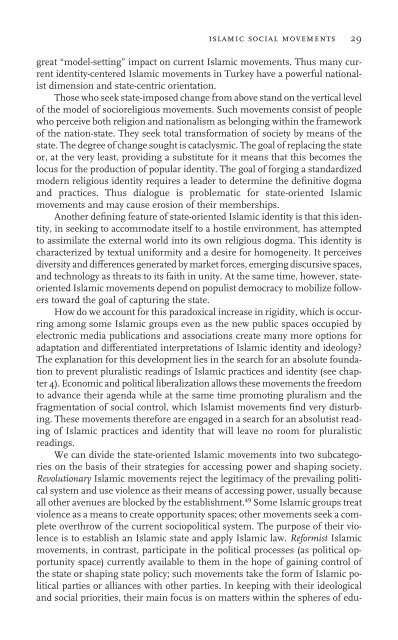You also want an ePaper? Increase the reach of your titles
YUMPU automatically turns print PDFs into web optimized ePapers that Google loves.
islamic social movements 29great “model-sett<strong>in</strong>g” impact on current <strong>Islamic</strong> movements. Thus many currentidentity-centered <strong>Islamic</strong> movements <strong>in</strong> <strong>Turkey</strong> have a powerful nationalistdimension and state-centric orientation.Those who seek state-imposed change from above stand on the vertical levelof the model of socioreligious movements. Such movements consist of peoplewho perceive both religion and nationalism as belong<strong>in</strong>g with<strong>in</strong> the frameworkof the nation-state. They seek total transformation of society by means of thestate. The degree of change sought is cataclysmic. The goal of replac<strong>in</strong>g the stateor, at the very least, provid<strong>in</strong>g a substitute for it means that this becomes thelocus for the production of popular identity. The goal of forg<strong>in</strong>g a standardizedmodern religious identity requires a leader to determ<strong>in</strong>e the deWnitive dogmaand practices. Thus dialogue is problematic for state-oriented <strong>Islamic</strong>movements and may cause erosion of their memberships.Another deWn<strong>in</strong>g feature of state-oriented <strong>Islamic</strong> identity is that this identity,<strong>in</strong> seek<strong>in</strong>g to accommodate itself to a hostile environment, has attemptedto assimilate the external world <strong>in</strong>to its own religious dogma. This identity ischaracterized by textual uniformity and a desire for homogeneity. It perceivesdiversity and diVerences generated by market forces, emerg<strong>in</strong>g discursive spaces,and technology as threats to its faith <strong>in</strong> unity. At the same time, however, stateoriented<strong>Islamic</strong> movements depend on populist democracy to mobilize followerstoward the goal of captur<strong>in</strong>g the state.How do we account for this paradoxical <strong>in</strong>crease <strong>in</strong> rigidity, which is occurr<strong>in</strong>gamong some <strong>Islamic</strong> groups even as the new public spaces occupied byelectronic media publications and associations create many more options foradaptation and diVerentiated <strong>in</strong>terpretations of <strong>Islamic</strong> identity and ideology?The explanation for this development lies <strong>in</strong> the search for an absolute foundationto prevent pluralistic read<strong>in</strong>gs of <strong>Islamic</strong> practices and identity (see chapter4). Economic and political liberalization allows these movements the freedomto advance their agenda while at the same time promot<strong>in</strong>g pluralism and thefragmentation of social control, which Islamist movements Wnd very disturb<strong>in</strong>g.These movements therefore are engaged <strong>in</strong> a search for an absolutist read<strong>in</strong>gof <strong>Islamic</strong> practices and identity that will leave no room for pluralisticread<strong>in</strong>gs.We can divide the state-oriented <strong>Islamic</strong> movements <strong>in</strong>to two subcategorieson the basis of their strategies for access<strong>in</strong>g power and shap<strong>in</strong>g society.Revolutionary <strong>Islamic</strong> movements reject the legitimacy of the prevail<strong>in</strong>g politicalsystem and use violence as their means of access<strong>in</strong>g power, usually becauseall other avenues are blocked by the establishment. 49 Some <strong>Islamic</strong> groups treatviolence as a means to create opportunity spaces; other movements seek a completeoverthrow of the current sociopolitical system. The purpose of their violenceis to establish an <strong>Islamic</strong> state and apply <strong>Islamic</strong> law. Reformist <strong>Islamic</strong>movements, <strong>in</strong> contrast, participate <strong>in</strong> the political processes (as political opportunityspace) currently available to them <strong>in</strong> the hope of ga<strong>in</strong><strong>in</strong>g control ofthe state or shap<strong>in</strong>g state policy; such movements take the form of <strong>Islamic</strong> politicalparties or alliances with other parties. In keep<strong>in</strong>g with their ideologicaland social priorities, their ma<strong>in</strong> focus is on matters with<strong>in</strong> the spheres of edu-




